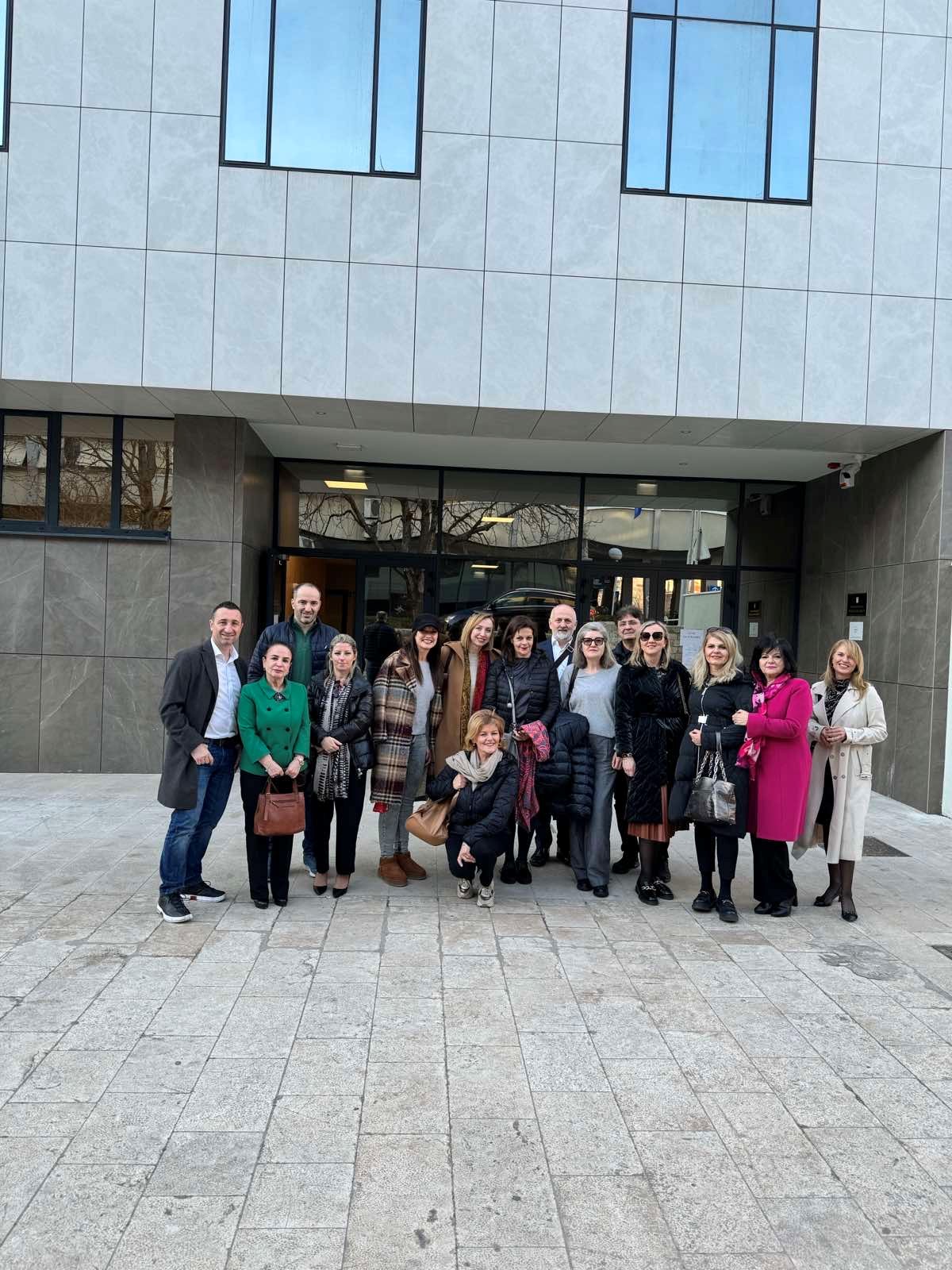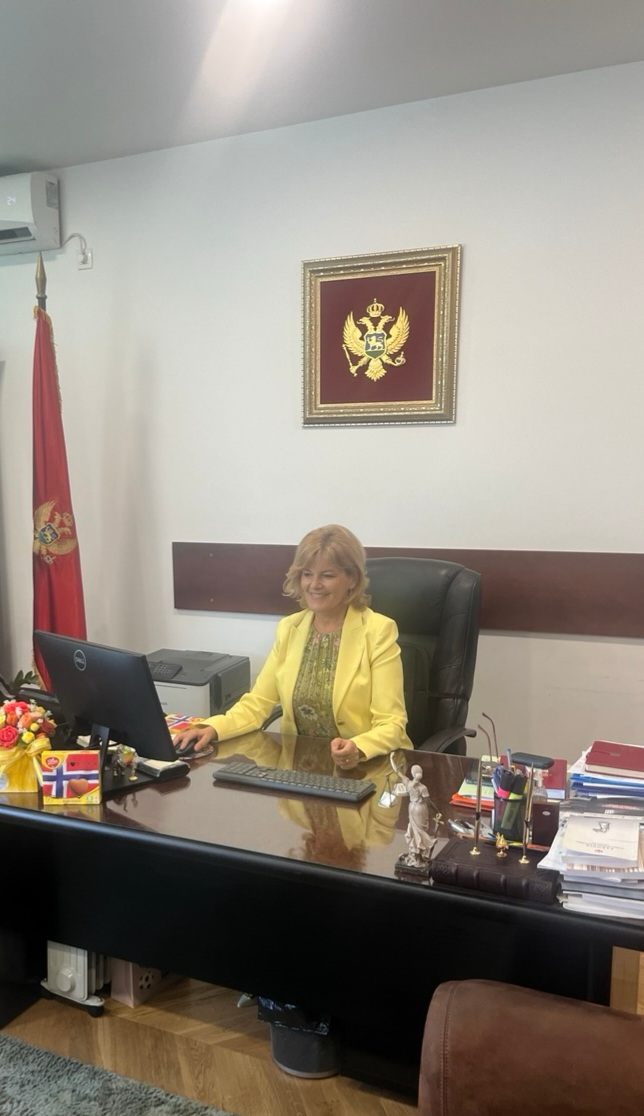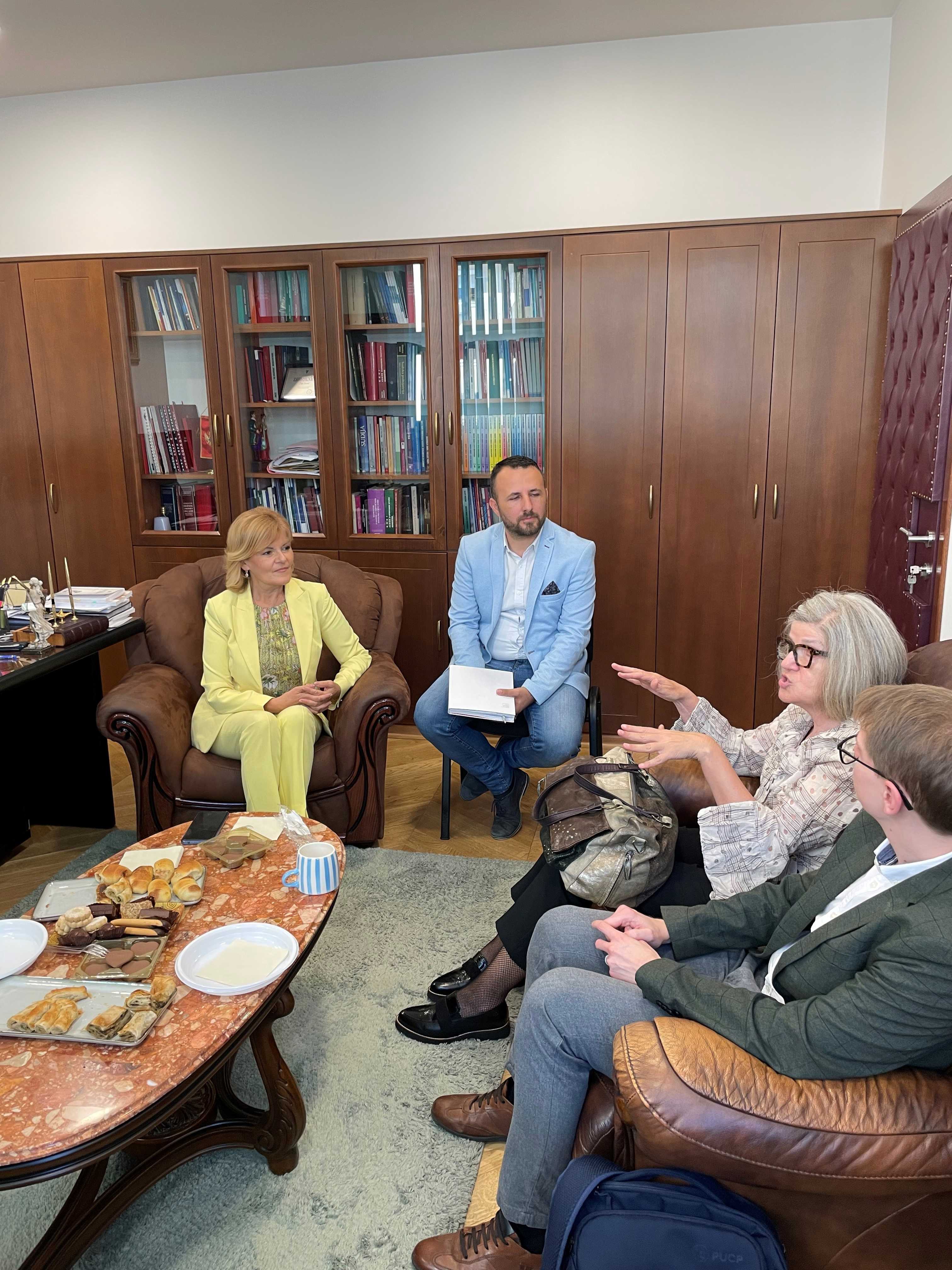Judicial Reform Programme for the Western Balkans – regional project
Invalid Date
The Norwegian Ministry of Foreign Affairs and the Norwegian Courts Administration signed in May 2022 a five-year grant agreement for Norwegian support to judicial reforms in the judiciaries of the Western Balkans.
Together with bilateral projects in Bosnia and Herzegovina and Kosovo the programme contains a project for the whole region, Croatia included. This project seeks in an operational way to identify and address the main procedural practices for non-compliance with article 6 of the European Convention on Human Rights (ECHR) in civil litigation.
Let us present what we do, and a let´s say hello to Ms Zeljka Jovovic. She is court president of the basic court in Podgorica, Montenegro, to which recommendations and guidelines from the regional analysis will be piloted.
The regional project with the Working Group on Judicial Management (WGJM) and the regional study
To ensure the relevance of the activities of the regional project, we established very early a Working Group on Judicial Management ( WGJM) in cooperation with the judicial councils of the region, with judges from each of the judiciary in the region together with representatives from Academia.

The current members WGJM:
- Ms Marcela Shehu, judge at District Court of Tirana and Mr. Erjon Muharremaj, professor at law, Law Faculty, Tirana,
- Ms. Vildana Fajić Poturović, Judge, Municipal Court Sarajevo, Ms. Amela Mulić, Judge, Municipal Court Sarajevo and Mr. Draženko Lugonja, Judge, Commercial Court Bijeljina
- Ms. Vesna Katarinčić, Judge, Municipal Court Rijeka and Ms. Martina Maršić, Judge, Municipal Court Rijeka,
- Ms. Teuta Ibrahimi, Judge, Supreme Court, KJC Member, Head of the Performance and Evaluation Committee and Ms Vera Gashi Bala, judge at the Commercial Court of Kosovo, Pristina,
- Ms. Željka Jovovic, President of Basic Court Podgorica and Ms. Sanja Došljak, Judge, Basic Court Podgorica,
- Ms. Blagica Gjoshevska, Judge, Basic Civil Court Skopje
- Ms. Marija Aranđelović-Jureša, Judge, Higher Court in Belgrade, Member of the High Judicial Council and Ms. Sanja Kostić, Judge, Court of Appeal, Nis
During the first meeting of the WGJM in December 2022, it was decided to carry out a regional study that will identify the main procedural obstacles to violation of ECHR article 6 in civil litigious cases, and especially focusing on the “within reasonable time” requirement of article 6.
The study includes an empirical research of judicial data from each judiciary, both at aggrevated (National) level as well as manually collected data from 50 randomly selected civil cases that were resolved in 2023. The project engaged Dr Juraj Brozovic from Faculty of Law, Zagreb University, and Dr Amer Demirovic, Assistant Professor, University Teknologi Brunei, to prepare this part of the report.
The regional project engaged Prof Dr Alan Uzelac, Faculty of Law, Zagreb University, to assist the WGJM in carrying out the study.
The study shall propose practical recommendations for diminishing the main obstacles. It will be presented to the judicial councils and with support from the feedback received, the recommendations will be piloted in selected courts in the region throughout 2025 until the end of the project in 2027, with subsequent guidelines as result.
The Basic Court of Podgorica, Montenegro and Ms Zeljka Jovovic
Ms Zeljka Jovovic is a very forward leaning court president in the Basic Court of Podgorica, and member of the WGJM. She launched her court as pilot court for the recommendations following the regional study.
In late September, 2024 we had meetings in Podgorica with Ms. Zeljka Jovovic and her court, as well as with the Judicial Council of Montenegro and the Ministry of Jutice, to start preparations of the pilot.
We asked Zeljka to present herself, her court and her thoughts about the upcoming pilot.
Dear Ms Zeljka Jovovic, please tell us something about yourself.
 I was born in Foča (Bosnia and Herzegovina) in 1968, where I finished elementary and high school. I graduated from the Faculty of Law in Sarajevo in 1992.
I was born in Foča (Bosnia and Herzegovina) in 1968, where I finished elementary and high school. I graduated from the Faculty of Law in Sarajevo in 1992.
After getting married, I moved to Montenegro, Nikšić, where I started my career by getting a job as an intern at the Basic Court in Nikšić in 1993.
I moved in 2006 to work as advisor in the Supreme Court of Montenegro, and from 2007 as registrar in the Supreme Court.
In 2008, I was appointed judge in the Basic Court in Podgorica, working in Criminal Department. I then went on to work as judge and later as court president in the Basic Court of Cetinje before I was elected as member of the Judicial Council from 2014 until 2018.
Since 2019 I am court president of the Basic Court in Podgorica – the largest court in Montenegro.
I have also served in several law commissions and worked a lecturer for international organizations like OSCE and Council of Europe.
On a personal level, I am married and a mother of three. My husband is a university professor, my daughter is a master of economics, my oldest son is an electrical engineer and the youngest is a law graduate. I also have a wonderful role as grandmother to little Anastasia.
You have recently been reappointed as the President of the Basic Court in Podgorica. As the largest court in the Montenegrin judiciary, what are the main challenges you have encountered during your term as president?
First, some few facts about the court. We have currently 41 judges in addition to me, and we have seven vacancies. The current number of non-judge staff is 151. We have criminal and civil division with their proper presidents. Administrative cases are litigated in the administrative courts.
After my first term as president, which lasted five years, I was given the trust and honor to lead the court in the second term. There are many challenges behind us, and they concern difficult working conditions during the Covid epidemic, then we had a strike of lawyers, as well as a large outflow of judges. All this has resulted in a significant increase in the number of cases in the work, which has led to a high workload of judges and the inability to adjudicate within a reasonable time. In recent years, we have also been facing a shortage of judicial staff, as well as a lack of interest of young staff in working in the courts.
The Regional Project and the WGJM, of which you are a prominent member, explore how improved case management practices in the Western Balkans judiciary can directly help to handle court cases more efficiently and thus better serve the needs of court users. The guiding principle is that in order to resolve a case effectively, the court should retain control over the pace of litigation, rather than allowing lawyers, parties, or other participants to dictate it.
In this regard, how do you - as the head of the court - assess the practice of managing the flow of case processing applied by judges in the Montenegrin judiciary? Are there specific areas that require improvement in order to improve the role of the judge as a leader in the judicial process? Some examples can relate to advances in the case processing techniques used by judges in terms of better preparing cases for the opening of a hearing, scheduling hearings, maintaining a calendar, communicating timeframes to participants in court proceedings, and monitoring and insisting on meeting deadlines.
 The right to effective judicial protection is an essential element of the rule of law. My impression is that in Montenegro the techniques for processing cases to not function fully. This is partly due to procedural laws, but also due to the lack of activity of judges in the consistent management of cases and the punishment of all participants in the procedure for non-compliance with procedural discipline.
The right to effective judicial protection is an essential element of the rule of law. My impression is that in Montenegro the techniques for processing cases to not function fully. This is partly due to procedural laws, but also due to the lack of activity of judges in the consistent management of cases and the punishment of all participants in the procedure for non-compliance with procedural discipline.
In addition to better case preparation, the judge has a special task to set clear deadlines for all relevant participants in the proceedings, whereby it is necessary to pay special attention to the improvement of the judge-expert relationship, due to the fact that, according to the World Bank's research, almost 1/3 of all delays in court proceedings are related to the work of experts, with 55.56% of cases lacking a court reaction.
The areas that require improvement in order to improve the role of judges as leaders in the judicial process, as members of the Working Group, have been presented in detail in the Report sent to the Working Group, and following the actions of judges, and based on conversations with colleagues who act in civil matters, I conclude that the most common reasons for postponing the hearing are the submission of submissions by the litigants immediately before the hearing, and, in this regard, the passive attitude of the court; problems with proper delivery; insufficiently precise and clearly set tasks for experts, which leads to objections from the parties, and additions to findings and opinions, as well as the preparation of findings and opinions in two or even more variants; frequent written objections to the findings of the expert, and in connection with this abuse of this right by the litigants, aimed at postponing the hearing.
In addition to the above, the reason for the postponement of hearings in a significant number is the failure to submit documents by state bodies or legal entities exercising public authority, in which direction the procedural law does not provide for sanctions.
Last but not least, I have to mention the importance of mediation as a way to resolve a dispute. I see several steps we can make to improve to use of mediation both before and during judicial proceedings. I don´t want to go into details about this here, but I am looking forward to see what we can do here.
The efficiency of courts is key to strengthening public trust in the justice system. You expressed your support for the proposal for your court to take on the role of a pilot court in the implementation of some of the recommendations of the regional working group report on how to carry out cases more efficiently throughout the court process. What is your primary motivation and main goal in implementing this pilot project? What positive changes do you hope to see by the end of the pilot program?
I absolutely agree that lawful and fair, but also efficient and up-to-date actions of judges not only improve the quality of the judicial process, but also contribute to preserving citizens' trust in the judicial system. In this sense, I see the motivation and main goal in the implementation of the pilot project in increasing the efficiency of the court of which I am the head, improving the current knowledge of judges and improving the practice of managing the flow of case prosecution. Also, in this project, I see a general goal, which is to strengthen public trust in the work of not only the Basic Court in Podgorica, but all courts. These are exactly the changes I expect, because as Spinoza said, "Peace comes from the truth."
What significant challenges could arise during this process and how can the Regional Project and the WGJM help address them?
From this time distance, bearing in mind that we are still waiting for the start of the pilot project, I cannot single out significant challenges that could arise during the process. However, bearing in mind that, in general, every new project brings challenges, I expect that they will relate to the behavior and actions of the parties, and especially their proxies. Also, if we bear in mind that a significant number of postponements of hearings relate to the conduct of expert witnesses, there will be challenges in this direction as well. For this reason, I have held meetings and announced the implementation of the Pilot Project to the President of the Bar Association and the presidents and members of the Association of Experts, from whom I am assured that they will provide full support to the Project, so that the Basic Court in Podgorica becomes an example of an efficient and up-to-date court, which is in the interest of all participants in the court proceedings. In this, the representatives of the regional project will certainly provide significant help and driving enthusiasm, and the rich experience and knowledge of the members of the Regional Working Group will enable us to overcome all the challenges we encounter.
Thank you for your time and for sharing, Zeljka!
For more information, please contact Ms. Amra Jasarevic Amra.Jasarevic@domstol.no or Mr Audun Hognes Berg audun.hognes.berg@domstol.no.